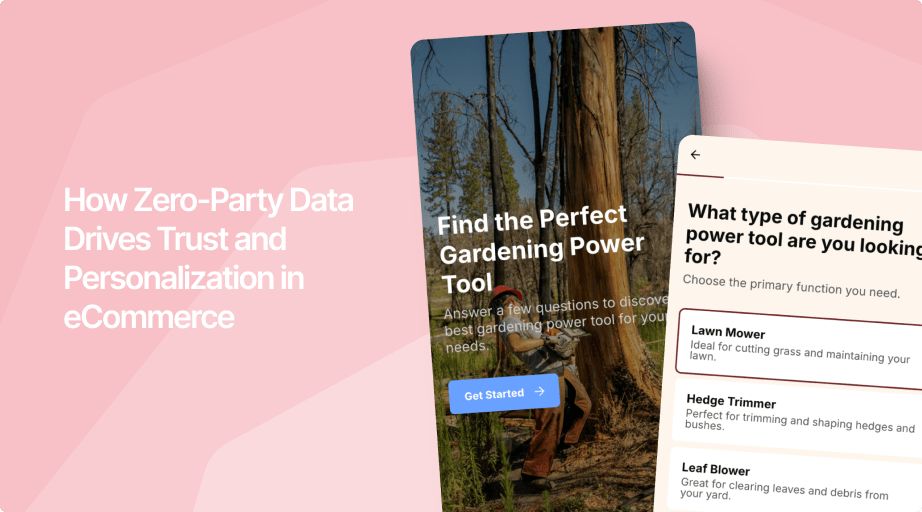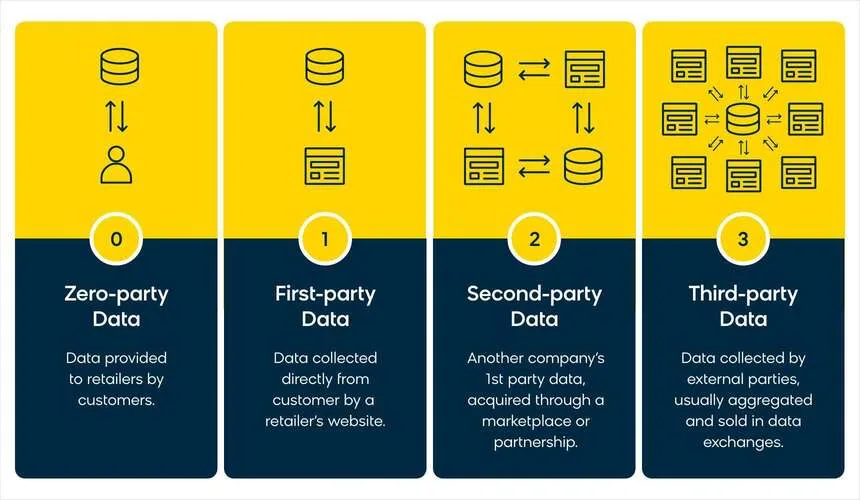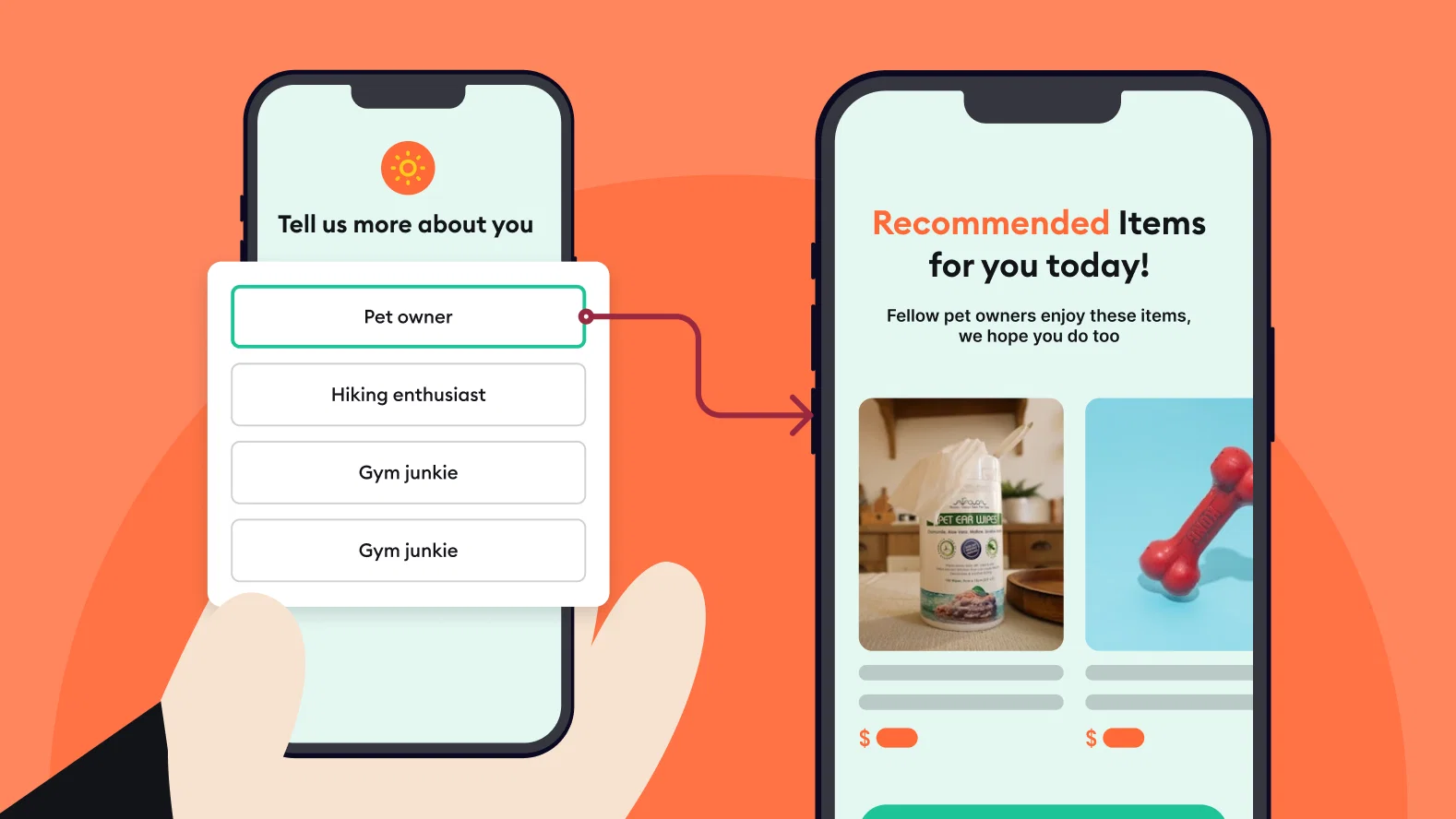
Balancing customization with data security has become a growing challenge for today’s eCommerce businesses. Traditional data collection methods often raise privacy concerns, leading to customer hesitancy and stricter business regulations. To handle this challenging scenario, one crucial question arises: Have you considered the power of zero-party data?
By willingly encouraging customers to share their needs and preferences, retailers can create highly personalized shopping journeys while building trust and transparency. Compared to first-party or third-party data, zero-party data puts the customers in control, ensuring their needs are met without overstepping privacy boundaries.
This blog post is your solution guide to explore the transformative benefits of zero-party data and its role in guided selling. Also, you will see how Crobox is redefining privacy-first personalization in eCommerce.
Unlike first-party data collected through customer interactions or third-party data sourced externally, zero-party data is information that customers proactively share with a brand on their own. This could include their personal preferences, needs, interests, or even future purchase intentions - making it both highly accurate and deeply insightful for the businesses.
What sets zero-party data apart is its reliability and trust. Since it is voluntarily provided, customers have full control over what they share, addressing growing concerns about data privacy. In an era of strong monitoring under regulations like GDPR, zero-party data offers a compliant and ethical approach to understanding customer needs.
For example, a fashion retailer can ask customers to select their favorite clothing styles during onboarding. Also, shoppers often share future purchase intentions through wishlist features or preference surveys, which also provide zero-party data firsthand.
The General Data Protection Regulation (GDPR) is a critical privacy law that has reshaped how businesses handle consumer data. GDPR was enacted by the European Union in 2018 and it protects personal data and privacy for individuals within the EU and EEA. It requires businesses to:
For businesses, these regulations emphasize the need for data transparency and consumer control over personal information. Zero-party data aligns with these regulations and lets businesses collect only the data that customers want to share. It reduces compliance risks while building trust and boosting customer experiences.

Understanding zero-, first-, second-, and third-party data | Source
In an increasingly competitive eCommerce market, guided selling is a no-brainer for customer-centric strategies. At its heart lies zero-party data, which transforms the guided selling tools into assets for personalization and engagement. Here's how zero-party data elevates guided selling to the next level:
Zero-party data helps guided selling tools to craft journeys tailored to individual preferences. These tools can provide personalized product recommendations by collecting data directly from customers, such as style preferences, specific needs, or budgets. With this method, every suggestion feels relevant to the customers, eliminating friction points and creating an on-point shopping experience for every customer.
Product advisors, for example, actively collect zero-party data from customers in real-time. These interactive features (like selling assistants) make shopping more engaging and provide valuable insights into customer’s needs. For example, a skincare brand can provide an interactive question form to ask about skin type and concerns. Using the responses, the system will recommend products that align with the customer’s unique needs at the moment.
Also, depending on the answers, the results can be used to update the product catalog and show product recommendations to satisfy the search intent in the future. This creates a win-win scenario: customers feel heard, and brands gain actionable data.
Zero-party data in guided selling eliminates friction in the product discovery process. By leveraging customer input, they can quickly narrow down the best options, saving time and effort for searching. Whether it’s finding the perfect pair of running shoes or the ideal laptop for remote work, guided selling simplifies the journey, leading to higher conversion rates and larger cart sizes without abandonment.
Zero-party data also provides insights into complementary customer needs, enabling guided selling tools to recommend relevant add-ons or upgrades. For example, after the customer selects a camera in your eCommerce store, they might be shown lenses or tripods tailored to their preferences. It will lead to increasing average order value and build trust that will keep customers returning again and again for what they need.
Companies face mounting challenges in generating zero-party data nowadays because several concerns have arisen between modern customers. Despite its value for personalization and trust-building, these factors make this process increasingly difficult:

Why zero-party data is essential for personalized customer experiences | Source
Using zero-party data ethically is essential for building trust, maintaining compliance with regulations, and creating meaningful customer relationships. Here's how your eCommerce brand can achieve that with no worries:
With these practices in mind, your company will meet regulatory requirements and strengthen customer loyalty. It will help you stand out from the crowd as a trustworthy brand which is crucial for conversion rates and business growth.
Zero-party data forms the backbone of the customer-centric personalization efforts in Crobox. By leveraging this data type, we empower brands to deliver exceptional experiences that resonate with shoppers. A prime example of this is our Product Advisor, which engages customers through interactive quizzes, guided recommendations, and preference-based interactions. Such tools help shoppers find products they’ll love and enable businesses to collect willingly shared data points for understanding the purchase motivations.
The true strength of zero-party data lies in its seamless integration into Crobox’s broader strategies for personalization and engagement. The zero-party data is utilized across the entire customer journey, from creating hyper-relevant product suggestions to crafting messaging that reflects individual tastes and building long-lasting connections with the customers.
The results speak for themselves. Brands using Crobox’s zero-party data strategies have seen measurable improvements in both engagement and conversion rates. Additionally, the rich insights gained from zero-party data provide businesses with a clearer understanding of what drives their customers’ decisions, enabling them to adapt more effectively to changing market demands.
To sum up the zero-party data approach, Crobox addresses the challenges of modern data privacy concerns and sets a new standard for ethical, trust-driven personalization in eCommerce. It’s worth mentioning that we take key steps with Vanta to strengthen compliance with security and privacy standards after the rise of AI concerns. Crobox fully complies with GDPR and all customer data is handled securely and transparently in line with the European data protection standards.
Unlike collecting traditional data, customers willingly share zero-party data, making it more reliable and accurate while addressing growing privacy concerns and regulations like GDPR and CCPA. However, ethical use, transparency, and customer satisfaction are essential to overcoming challenges and expressing their full potential. Trust-driven personalization powered by zero-party data isn’t just an advantage - it’s a main frontier for eCommerce success.